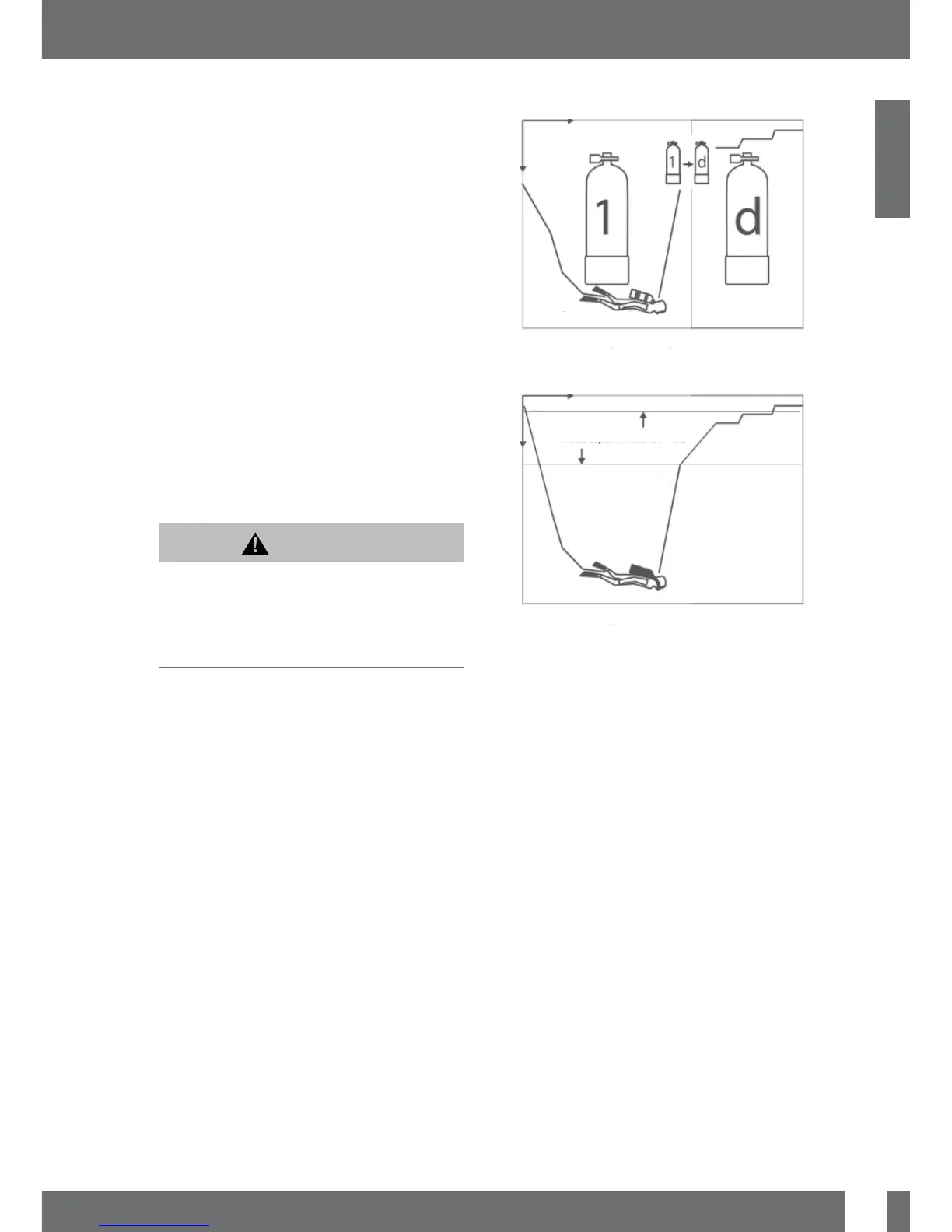SCUBA system because the basic operating
principle with manual control didn’t require a
highly reliable regulator system.
CCR also uses the gas more efficiently than
open loop, because the oxygen is added
to the breathing loop only as much as
needed. Respectively the carbon dioxide
generated by the body is bound to calc
at the scrubber. As a side effect the CCR
system is nearly bubble free, which may be
beneficial when engaged in photography
or observing fishes underwater.
In the CCR system the breathing gas ppO
2
(partial pressure of the Oxygen) is kept
constant. The CCR system itself takes care
of this. Compared to an Open Loop system
the constant ppO
2
converts to a variable
nitrox mix at different depths.
For example, a ppO
2
setting of 1.0 bar is
comparable to open an loop 50% Nitrox
mix at a depth of 10 meters of salt water.
WARNING
All rebreathers require unit specic education
before using them. Get the proper certications
and follow manufacturer recommendations and
procedures when diving with a rebreather unit.
Deviations may lead to severe injury or death.
4.8.7 Enabling the CCR mode
When the CCR mode is activated, the
normally changeable open circuit gases
(Gas1, Gas2) are converted to ppO
2
setpoints (SP1, SP2).
The dive start setpoint (SP1) has a selectable
range from 0.3 up to 0.95 bar ppO
2
. The
bottom setpoint (SP2) has a range from
1.0 up to 1.4 bar ppO
2
and this is switched
normally active on the way to the bottom or
when the bottom depth is reached.
The SP switch depth is suggested by
the dive computer the same way the gas
switches are suggested in open circuit
mode (predictive gas switching).
The switch points are determined from
the equivalent oxygen contents in open
circuit mode. So, the SP1 is suggested to
be changed on the way down when the
equivalent content of the gas at that depth
reaches the 21% O
2
level.
For example, with a SP1 of 0.5 bar the depth
would be approximately 13.8m in salt water.
Depth
Time
Bottom mix
Deco mix
Diving with 2 gas mixtures
Depth
Time
Diving with CCR
Switch depth between SP1/SP2
SP1 SP1
SP2 SP2
4.8.8 Altitude diving
Altitude classes, altitude warning and no-fly
time after a dive.
Going to altitude is in a way similar to starting
an ascent from a dive: you expose your
body to a lower partial pressure of nitrogen
and consequently you start offgassing. After
a dive, given the higher nitrogen loading
in your body, even reaching an otherwise
negligible altitude can potentially cause
decompression sickness. Consequently,
MANTIS constantly monitors the ambient
pressure and uses it to evaluate your
nitrogen loading and offgassing. If MANTIS
notices a drop in ambient pressure not
compatible with your current nitrogen
loading, it will activate a warning to alert
you of the potentially dangerous situation.
If you have remaining desaturation on
MANTIS, you can view the current situation
by selecting the dive menu.
The desaturation text and remaining count
down time are shown on the middle row.
The no dive symbol and count down timer
are shown on the top row to indicate the
